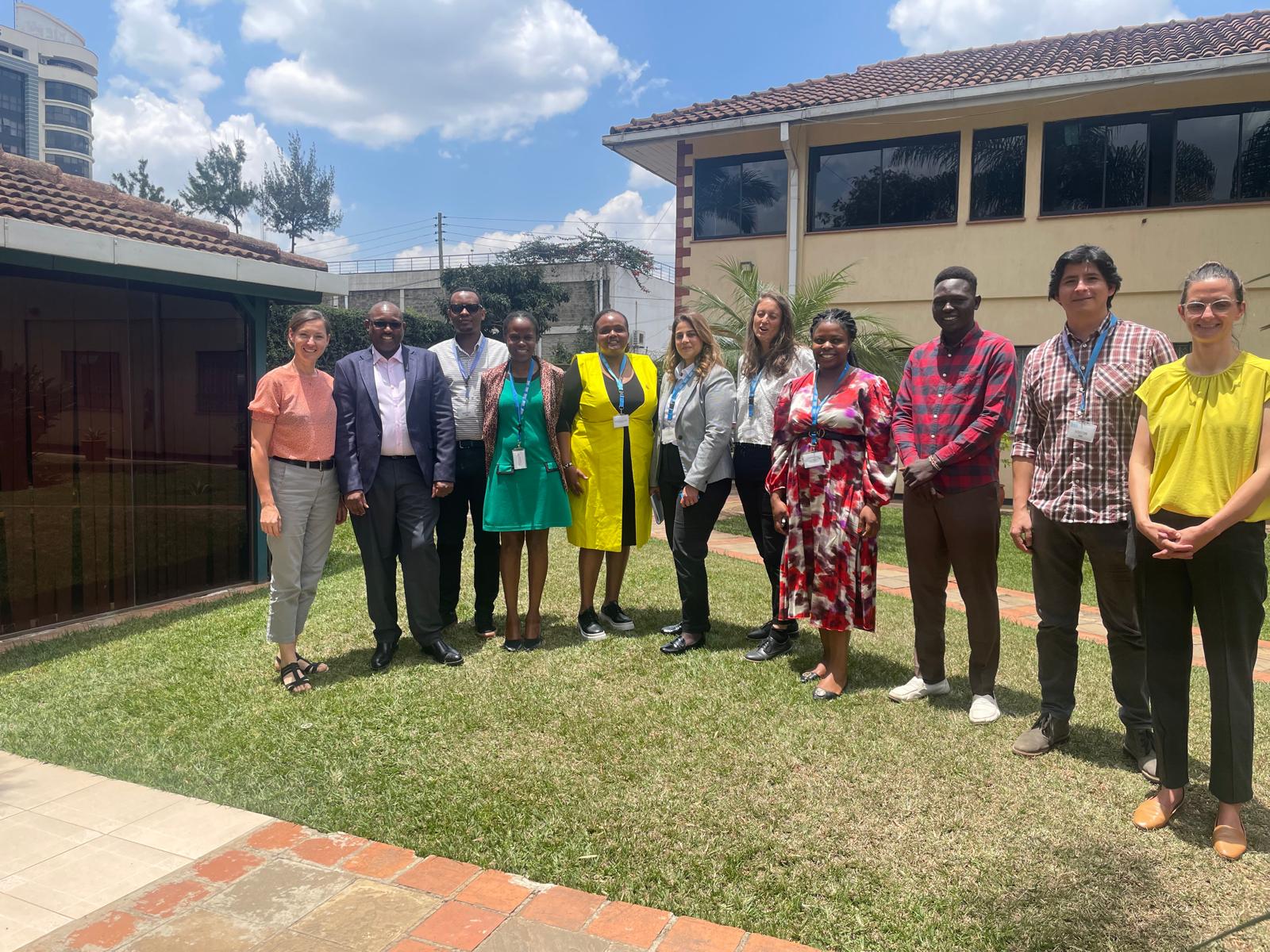In this section
In this sectionOn October 9th, the Global Platform for Action on Sustainable Energy in Displacement Settings (GPA) and Norwegian Capacity (NORCAP) hosted a Clean Cooking Roundtable at the SNV Office in Nairobi, Kenya, with a focus on advancing clean cooking initiatives in humanitarian contexts. This gathering, which included partners such as the Food and Agricultural Organization (FAO) of the United Nations, the Office of the United Nations High Commissioner for Refugees (UNHCR), Sustainable Energy for All (SEforAll), Practical Action, Modern Energy Cooking Solutions (MECS) Programme, SNV, as well as representatives of the GPA Coordination Unit and NORCAP HQ, was a critical opportunity to collectively address the persistent challenges and opportunities associated with clean cooking in displacement settings. The meeting reaffirmed the partners’ shared ambitions to drive sustainable energy solutions for displaced communities, despite considerable funding and infrastructural challenges.
The discussions during the roundtable were fuelled by the diversity of perspectives brought by partners working across different sectors (spanning energy access and beyond) and geographies. A recurring theme was the need for more innovative, sustainable financing models for clean cooking, as traditional funding channels often fall short in reaching underserved populations, both the displaced and the host communities. Partners highlighted the potential for carbon finance, which could unlock larger investments by tapping into the growing market for climate funding. However, accessing these resources requires improved impact assessments and data collection to meet the increasingly rigorous requirements, particularly challenging in the complex humanitarian settings.
All partners recognised that simply introducing new cooking technologies is not enough and that sustainable models for the delivery of clean cooking services are needed. Ensuring that these solutions are both accessible and effective requires fostering local expertise and ensuring community buy-in, as well as robust customer support. Strengthening local supply chains was highlighted as central to promoting market-based approaches to clean cooking access delivery as exemplified by Practical Action’s efforts to support market development for e-cooking devices in Bangladesh. Behavioural change initiatives will also play an essential role in promoting adoption, especially for modern energy cooking solutions. This is where partnerships can be instrumental— they can leverage strengths of the different stakeholders and help create sustainable clean cooking ecosystems. SOLCO is one of such initiatives that has firmly embedded the power of partnerships into its rollout.

The importance of adopting a holistic, nexus-based approach also featured prominently. Clean cooking intersects with food security, livelihoods, and environmental conservation, and addressing these linkages can improve outcomes across sectors. FAO’s integration of clean cooking with agricultural activities in Uganda is one example. Their support for both refugee and host communities not only provides cooking solutions but also strengthens local economies by enabling agricultural productivity and income generation. This comprehensive model, which aligns humanitarian assistance with development support, could serve as a blueprint for other partners aiming to create sustainable impact.
The roundtable discussions also underscored the importance of including refugees and displaced persons in decision-making processes. SEforALL, FAO and other organisations emphasised the need for participatory approaches that account for local context and preferences, as well as accessibility for all, including people with disabilities. This point was reinforced by SNV’s market-based approach in Kenyan refugee camps, where they introduced electric pressure cookers (EPCs) and engaged local cooperatives to create demand. By integrating communities into the planning and implementation stages, these efforts improve the relevance and effectiveness of clean cooking interventions.
However, despite a lot of alignment and efforts to scale up successful approaches, the participants recognised that clean cooking in displacement settings – be it emergency response, protracted humanitarian crises, or internal displacement, often struggles with visibility in global advocacy arenas. As a collective, there is a need to amplify clean cooking in humanitarian and displacement settings into global agendas, from international climate conferences to sector-specific platforms. The Roadmap for the Brazil G20 Presidency’s Clean Cooking Strategy is one of the recent milestones, yet there is more work to be done to secure broader political support and donor commitments. Several partners, including MECS and UNHCR, noted the potential impact of a collective advocacy to highlight the unique challenges of displaced populations and their right to clean, affordable and sustainable energy access.
Looking forward, the roundtable spurred several action points, among which was a commitment to deepen our collaboration on data collection, impact assessments, and evidence generation. The goal is to build a robust evidence base that speaks to funders, policymakers, and private investors. By capturing the social, economic and environmental impacts of clean cooking initiatives, a stronger case for funding and scale-up of these projects to reach more communities can be presented. Another priority is to pursue joint initiatives around carbon finance, which holds significant promise if we can better align our work with the needs of carbon developers and investors, and the nexus of clean cooking access, food security and agriculture, and livelihood support which should also prioritise ambitions for higher-tier cooking solutions, to reduce as much as possible the reliance on unsustainable biomass. Lastly, ensuring that not only households but also institutions where large-scale cooking takes place daily (e.g. in schools) should be targeted by clean cooking projects, programmes or initiatives. These settings hold a lot of potential for impact at scale, resulting in significant reductions in greenhouse gas emissions, reduced harvesting of firewood, and time and cost savings for schools and other institutions.
For partners and colleagues who are interested in any of the above themes that were discussed during the roundtable:
- carbon finance,
- higher-tier cooking solutions,
- nexus approaches to clean cooking provision,
- institutional clean cooking transitions, and
- impact evaluations for clean cooking in displacement settings,
please feel free to reach out to the GPA & NORCAP by contacting Iwona Bisaga on Iwona.bisaga@unitar.org.
Last updated: 08/11/2024
